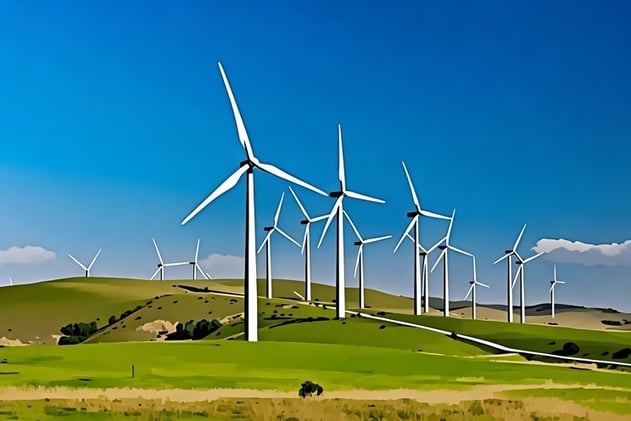Archive

Can direct air capture make a game-changing difference to carbon emissions?
While still an emerging technology, direct air capture could play an important role in the fight against climate change by removing existing carbon emissions from the atmosphere. However, it’s scalability is currently restricted by the high costs involved and amount of energy required to extract, distil and store carbon underground. Despite these limitations, both private and public investors have seen the potential direct air capture offers, and with several innovative start-ups pioneering more energy efficient solutions, the stage is set for growth.


A deep dive into desalination’s energy problem (and solutions)
With over 40% of the world’s population affected by water scarcity, the desalination industry is essential to global development. However, while it is providing clean water to more than 300 million people, the 21,000 desalination plants worldwide require huge amounts of energy, the majority of which still comes from fossil fuels. Thankfully, alternative ways of operating are emerging, with innovations ranging from harnessing renewable power sources to improving the materials used to make the process as cost-effective and energy efficient as possible.


Will the dial finally shift on energy storage in 2025?
As renewables start to make up more of the overall energy mix, reliable storage will be essential to reduce the impact on the grid and ensure a steady distribution of power despite seasonal fluctuations. While grid-scale storage is a necessity, its growth has been limited by high costs, deployment complexities, and international supply chains. But will 2025 be the year when this finally changes, and we see grid-scale storage capacity ramp up to meet requirements?


Expensive energy: The UK and USA’s big AI problem
AI has been one of the fastest growing industries in recent years and is already transforming the way the world works. The UK and the US have both made pledges to embrace this evolving technology and the economic benefits it could yield, but their ambitions may be thwarted by the massive amounts of energy AI consumes. Not only will this have an environmental impact, but the costs involved run the risk of causing a resurgence in fossil fuels – a potential roadblock on the road to net zero.


Who were the most sustainable energy suppliers for 2024 in the UK?
With many domestic suppliers claiming to offer green tariffs, it would be easy to assume that the UK’s energy market is dominated by sustainable brands. But when you dig into the numbers and look at the companies that are going the extra mile to invest in and generate renewable energy, the field narrows considerably. The most sustainable energy suppliers in 2024 not only offered renewable tariffs but also cemented their commitment to the energy transition by actively investing in solar, wind, and biomethane.


Shining a spotlight on green steel start-ups
As one of the world’s most used materials – and with one of the largest carbon footprints – the steel industry has long been considered one of the hardest sectors to decarbonise. While more sustainable production processes are available, harnessing hydrogen and renewable energy, these are more expensive and rely on restricted resources that hinder their adoption by legacy manufacturers. However, green steel start-ups are showing that there may be another way forward – and investors are starting to see their potential.


The largest funding rounds of 2024
Looking back at 2024, investment in the renewable and cleantech sector continued to grow. While economic constraints could have dissuaded investors, funding has consistently increased since 2020 and hit record sums this year. However, looking at the companies that attracted the most significant investment in 2024 illustrates that funding is still largely concentrated within the developed world and channelled towards firms which are already relatively established, have a product with mass market appeal, and formed partnerships with big name corporations.


Decarbonising industry: Spotlight on cement
As one of the world’s largest contributors to carbon dioxide emissions, cement is a material that desperately needs to be decarbonised. Happily, there are several innovative companies making strides in green cement, adopting alternative materials and production methods as well as capturing the carbon emitted by traditional Portland Cement manufacture. With the use of cement expected to grow exponentially in the coming years, the green cement industry represents a massive environmental and economic opportunity that could transform the way the construction sector operates.


Is sector coupling the answer to renewable intermittency?
Sector coupling could offer an innovative solution to maximise the efficiency of renewable energy and overcome the challenge of fluctuating production volumes. A new way of thinking, sector coupling is designed to integrate different energy subsectors, bridging the gap between demand and production, and finding ways that power can be effectively stored and transferred when and where it is needed. With the potential to reduce emissions in industry, transportation and buildings, sector coupling has already been successfully adopted in markets such as Denmark.

The flightpath to decarbonising aviation
An industry with high emissions that are hard to abate, aviation has several challenges to overcome in its efforts to decarbonise. Despite this, it has committed to achieving net zero by 2050, enacting changes that range from investing in newer and more efficient aircraft to carbon offsetting. Sustainable aviation fuels (SAF) arguably have the most potential to help the industry decarbonise but competition for feedstocks, high costs and technologies that are still in their infancy mean that the pace of progress has been slow to date.


Recycling rare earth materials
With rare earth elements an essential component in everything from smartphones and laptops to electric vehicles and wind turbines, demand for these materials is set to rapidly increase as electrification grows. However, an uncertain supply chain, the high energy consumption of mining, and the vast quantities of electronic waste being produced have led many experts to look to recycling to help satisfy the increase in demand. But can these elements be recycled effectively?


The UK, wind and China
With the UK home to the perfect blend of natural resources to make wind energy a viable alternative to fossil fuels, it’s unsurprising that the Government is looking to maximise its potential – and quickly. With Scottish Power awarding Hull-based Siemens Gamesa a £1 billion contract to build turbines, growth in this industry could benefit the environment and the economy. But some are looking to outside sources to help accelerate capacity. China dominates the international wind energy supply chain, but it’s not got there without controversy. Could welcoming input from here be a short-term fix with long-term consequences?


